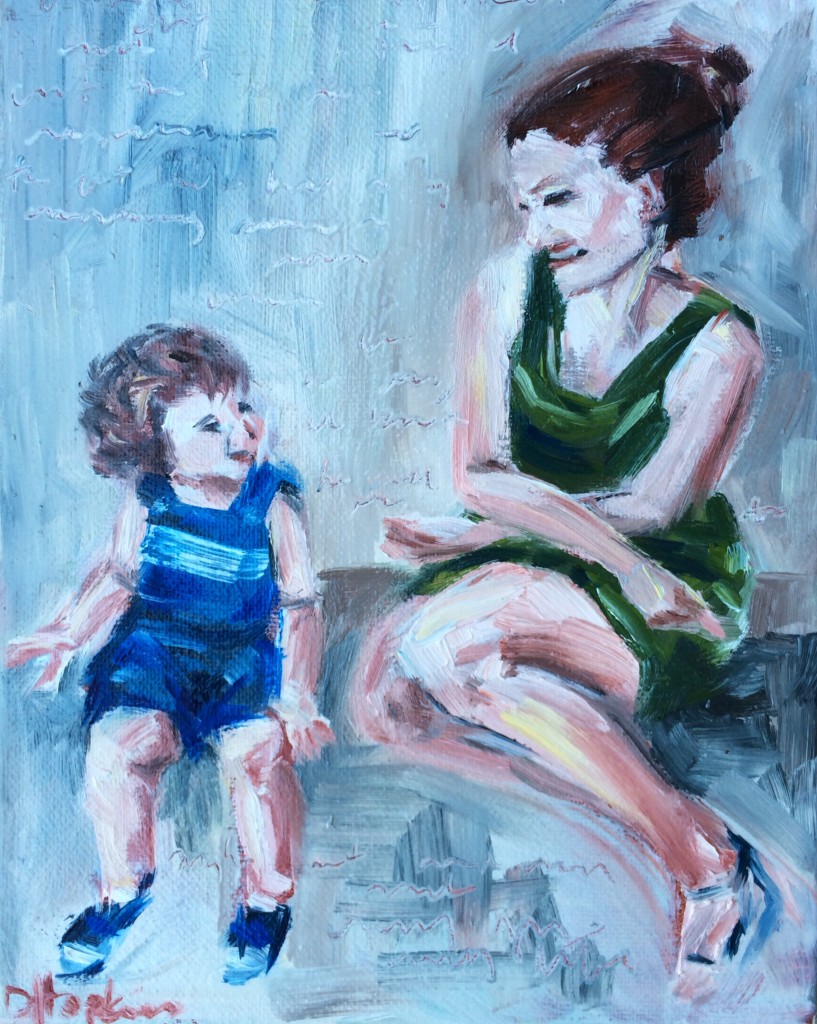The Art of Parenting: You Win Some, You Lose Some, and Then…
Home > The Art of Parenting: You Win Some, You Lose Some, and Then…
“When He Looks at Me”, 8×10, oil on canvas
My mom has a friend whose daughter had triplets. Triplets. They came over today. It took both mother and daughter to carry in three fancy- looking baby carriers which they then sat down on our kitchen floor. Three sets of wide-eyed, incredibly calm eyes looked up at me and my son. They stayed that way for thirty minutes and then were picked up by their carrier handles and lugged into the car from which they had arrived. Nine months old. No crying, no wiggling, no, well, anything. The mom got a couple smiles out of them when she tickled their feet. Other than that, content and docile staring.
My reaction to interactions like these is almost always one of disappointment. Really? Can’t ya just cry a little? Need to be bounced? At least interrupt your mom with squealing while she’s trying to talk?
At thirty-two, I’m surrounded by people having babies or raising them, the vast majority of them with the aid of a spouse.
I’m not proud of what I’m about to say. In my self-righteousness, my fire-and-brimstone, God-as-scorekeeper-mentality that comes from God knows where, I too often think this: Certainly, I should have been the one to get a so-called “easy” baby– the kind that sleeps well, eats well, is content. The kind you can sit on top of table in a restaurant and not once have to take out of the carrier. The kind that doesn’t keep you up all day and night when your world has come undone and you can’t drive your car without watering the steering wheel with your tears.
My baby was a screamer. He turned not red but purple. Many times the screams would be so prolonged I’d panic, beg him to catch his breath. He wouldn’t sleep, day or night, unless pressed against my chest and then only for what seemed insignificant increments. He nursed vigorously and often and when the stress finally caught up to me and my body stopped producing milk, the formula that supposedly helps babies sleep longer through the night left me with a full but still wakeful baby.
When I am honest, I realize I resent good babies, the carefree lifestyles I project onto those two- parent homes. Clearly, obviously, undoubtedly, it is I that should have had the sleeper, the calm, docile child who seems to require so little attention much less effort.
I have sometimes wondered whether, perhaps, my son being, let’s just say demanding, was some kind of gift or mercy without which I would have gotten in bed and never re- emerged. But even that thought often feels a contrived justification of what my prideful self knows to be a gross injustice.
What a terrible space to inhabit: judge and victim. Using limited and flawed vision and seeing objective truths
Sometimes Ezra looks at me, and I see how often I’ve wished he were some other child. He is my joy, my life, my treasure. How could I have ever and how can I still wish him someone else? He is, without a doubt, the one I want.
I’ve been reading more lately. Finally finding a rhythm to my day, figuring out how to both paint and read whereas I’ve usually dropped one to pursue the other. This new rhythm has led me to a book I never thought I’d read which belongs to a genre I never thought I’d notice: The 7 Habits of Highly Effective People found in the self-help department.
I come to things late. A painting a day has long been a movement. I read the first Harry Potter in graduate school, some ten years after it had been published. The 7 Habits was published in the 80s, and I picked up a few weeks ago after an artist on a podcast I listen to recommended it.
I didn’t expect to even like it as I am wary of self help in general. It’s simple, quietly revolutionary, and I highly recommend it. Early on, Steven Covey discusses paradigm shifts and the scripts by which we live our lives whether or not we have written them or believe in them.
A parenting paradigm shift has been building for quite some time, but it actualized today. I looked at Ezra and realized this: We play for the same team. So much of my parenting has been a struggle, a word that, in this context, seems a euphemism. It’s been more than that– a battle, possibly a war. When Ezra was younger, I would even joke about keeping score. When he wouldn’t take a nap or eat his peas it was “Mommy: 0, Ezra:1”. The joke turned into more of a “Mommy: 0, Ezra: 2,562” kind of hyperbole.
Yesterday, Ezra and I got home from the gym, a normal morning activity and prepared for lunch, another normal part of our daily routine. He didn’t want to sit in his highchair and was screaming at the food I offered. It was the brink of a full-fledged temper tantrum, arms flailing and all. This, unfortunately, is also a very normal part of our routine, and it usually exhausts and frustrates me. I lose my cool. I whisper obscenities to the cabinet as I search for his sippy cup.
Yesterday I didn’t. I was calm, distracted him from his torment, got him to eat even his green beans. I was unwavered, undisturbed by his fit and, miraculously, he calmed down. The difference wasn’t my reaction; it was my attitude. This was not the end of the world. It would be fine. He was going to eat his lunch, and I was going to help him to do it.
When I felt myself getting frustrated today, I remembered yesterday. It was not the end of the world and, in addition, how fragile my world if a two year old’s cries could rock its foundation.
We play for the same team, and I am the captain. We aren’t at war, and he isn’t my enemy. How delightful a paradigm shift and how exhausting to war with the one you most love.
This painting is a study for a larger piece I’d like to do. The words on it are a love letter to my precious son that starts with “when you look at me…”
In the 7 Habits, Covey talks about the space between stimulus and reaction. The space of choice, that obnoxiously powerful, freeing place where you get to decide how you will react.
My response to our less-than-pleasant episodes is usually frustration, but now, (at least in theory and in commitment) it’s, what would help this? What’s the real issue? This isn’t the end of the world.
Last Sunday, Ezra was being loud in church and, although more still than usual, was not responding to my demands and coaxing to be quiet. I felt myself getting frustrated but tried to focus on the fact that he was sitting still (for the most part) and not throwing things. That, indeed, was an improvement.
On the way home, I realized that perhaps he didn’t know what quiet meant and that my frequent requests for him to “be quiet” meant not little but nothing to him. The whole way home we (joyfully I might add) practiced saying words very very quiet then very very loud. It’s going to take more practice and reinforcement, but I think he’s learning what the words mean which will make it much easier for him to “obey” me next week in the pew. And if he doesn’t? Well, I’ll just have to think about how I’ll react, knowing it’s not the end of the world and that I am capable of helping him learn age-appropriate manners and reverence in the different social situations in which he finds himself. Did I just say that? Really?
All day today, I asked Ezra “are we on the same team?” to which he replied “yep” and we high fived. And now, as I write this, I realize it’s not just that we’re on the same team, but the game we’re playing isn’t even really a competition. It’s not the Super Bowl, and it’s certainly not a war. It’s more like a game of pick-up, competing to sharpen one another’s skills but not really keeping score.
In that kind of game, we’re on the same team, and it’s an honor.
Denise Hopkins
August 14, 2014
Share Post
blog
Related Blog Posts
Art/Poetry Spotlight: “Fire Kindled Before you were Born”
Fire Kindled Before you were Born, 6×6, oil on canvas Last month, the gallery hosted our first ever poetry night....
🎨 A Father’s Day Gift Guide for Every Kind of Dad (Featuring Fine Art Prints!)
Father’s Day is in a few short weeks. Celebrate the dad in your life with art this year! He has...
New Bird Minis Preview– May 2025!
9 new bird minis will be available first to my VIPS at 8am on May 3 2025. They will all be...

Join the Denise Hopkins Fine Art VIP Club Today
Become a member and enjoy early access to new releases, exclusive discounts, and a new wallpaper for your computer or tablet. Elevate your art journey with us.






One Response
Denise, this is beautiful, and profound. Johnny read that book years ago (I still haven’t gotten around to it), and he often speaks of the necessity of a paradigm shift. I know it can make all the difference in the world. If I had the chance to raise our five kids all over again, I would probably try to make such a shift. Of the five, we had one “easy” baby/toddler. The rest were loud, active and sleepless. But I’m sure that was due in great part to our lack of a normal schedule. They just came with us and did what we did, falling asleep when they got tired. I guess the upside of that crazy lifestyle is, they were always a part of the ministry we did. And they grew up believing that prayer and worship and fellowship were normal things that people did. So now, as adults, they still do them. And we still stay up late and live our lives tired. But it’s what we know, and how we roll. And you really DO survive all those sleepless years. So when Ezra is grown up (which right now seems an eternity away, but it’s really not), he’s going to remember having an awesome mom who held him and played with him a lot, and sang and cooked and created things. He’ll be happy and awesome, and you’ll remember being tired, but you really won’t mind it anymore. Any if you think your heart melts when he smiles at you now, just wait till he does it at ten, and 18, and 25. “The sufferings of this present time are as nothing compared to the glory to come…”